★★
“Lost and found”
 I certainly admire the aim here; there’s aren’t enough action-heroine films which are aimed at a family audience, especially with a young protagonist. We’ve had The Golden Compass, Enola Holmes and Abigail, but they are pretty rare. This is a considerably lower-budget entry than those, though make no mistake, it still certainly qualifies here. Its 11-year-old heroine, Resilience O’Neil (Finn) – known for obvious reasons as Rizzie – has no apparent fear, whizzing around the Utah desert on her mini-bike, until a flash flood separates her from her parents and younger brother. She then has to survive on her own, fending off wolves, haboobs and a pair of predatory creeps, while making her way back to civilization to get help for her family.
I certainly admire the aim here; there’s aren’t enough action-heroine films which are aimed at a family audience, especially with a young protagonist. We’ve had The Golden Compass, Enola Holmes and Abigail, but they are pretty rare. This is a considerably lower-budget entry than those, though make no mistake, it still certainly qualifies here. Its 11-year-old heroine, Resilience O’Neil (Finn) – known for obvious reasons as Rizzie – has no apparent fear, whizzing around the Utah desert on her mini-bike, until a flash flood separates her from her parents and younger brother. She then has to survive on her own, fending off wolves, haboobs and a pair of predatory creeps, while making her way back to civilization to get help for her family.
What’s weird is, the titular gems are all but irrelevant. In the opening twenty minutes, there’s a lot of talk about them, and their loss 150 or so years ago. But apres le deluge, they are almost entirely forgotten, and what we have instead is a straightforward wilderness survival story. To be honest, this is a considerable improvement over the thoroughly unconvincing historical re-enactments in the beginning, complete with sepia tinting and fake film scratches. The flood is staged surprisingly well, to the point I was convinced everyone concerned was sure to be dead. Finn seems to do a lot of her own stunts too, and not just on the bike. There’s a sequence of her clambering down a rockface which had me looking up the number for Child Protective Services. Decent dronework and the pleasant Utah scenery also stopped me from turning this off entirely.
For much, much worse are both the script and the performances. There’s hardly a line here which doesn’t seem forced and/or unnatural, and as noted above, the lost treasure thread is set up at painful length, before being abandoned for an hour. Then there’s the stuffed chicken carried around by one of the villains, who in addition are so incompetent as to pose no credible threat at all. I will give Kiara a pass; it’s her debut, and few actresses her age would be able adequately to put over the emotions necessary here, after the apparent loss of her family. [Natalie Portman in Leon remains the gold standard]
However, none of the adults are any better, either engaging in wild over-acting or resorting to a dull monotone when delivering their dialogue. It doesn’t help that there are issues with some of the audio, which varies wildly in quality, and is occasionally indecipherable. As a result, you’ll find yourself gritting your teeth just about every time anyone opens their mouth. This is probably the first time I’ve felt that a movie would have been better off, filmed as a throwback to the silent era – just pit Rizzie against the natural world, without chit-chat. I admit it would have been considerably more challenging as a project. Yet even if unsuccessful, I think I’d have preferred that approach.
Dir: Brian Finn
Star: Kiara Finn, Don Shanks, Adam Johnson, Gisi Hong
a.k.a. Resilience and the Last Spike





 This version of the world is more or less identical to our own. Except, several hundred years ago, there was a catastrophe in which massive dragons rampaged around, with humans being collateral damage. A secret society called the Earthbound managed to end the thread, partly through the invention of the Spell Web – basically, an Internet for magic users. Now, the Earthbound and a secret government organization, the Supernatural Intelligence Group, operate to keep a largely oblivious population in the dark. Though everyone knows dragons are extinct… aren’t they?
This version of the world is more or less identical to our own. Except, several hundred years ago, there was a catastrophe in which massive dragons rampaged around, with humans being collateral damage. A secret society called the Earthbound managed to end the thread, partly through the invention of the Spell Web – basically, an Internet for magic users. Now, the Earthbound and a secret government organization, the Supernatural Intelligence Group, operate to keep a largely oblivious population in the dark. Though everyone knows dragons are extinct… aren’t they? It probably didn’t help that I watched this the same day as I finished off the slick, well-animated and occasionally downright beautiful
It probably didn’t help that I watched this the same day as I finished off the slick, well-animated and occasionally downright beautiful 
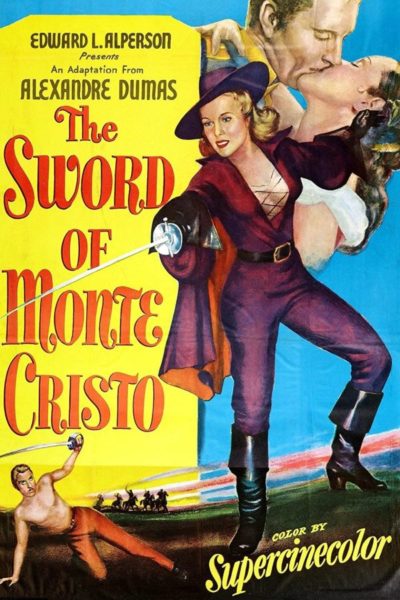 This 1951 movie is a bit clichéd. But then one has to consider that a lot of these weren’t clichés at the time the movie was made. That said, you will find everything here that you might expect from such a movie: A good king, his evil scheming brother who wants his throne, a dashing captain who has his way with the ladies, revolting citizens, a hidden treasure and a beautiful lady.
This 1951 movie is a bit clichéd. But then one has to consider that a lot of these weren’t clichés at the time the movie was made. That said, you will find everything here that you might expect from such a movie: A good king, his evil scheming brother who wants his throne, a dashing captain who has his way with the ladies, revolting citizens, a hidden treasure and a beautiful lady.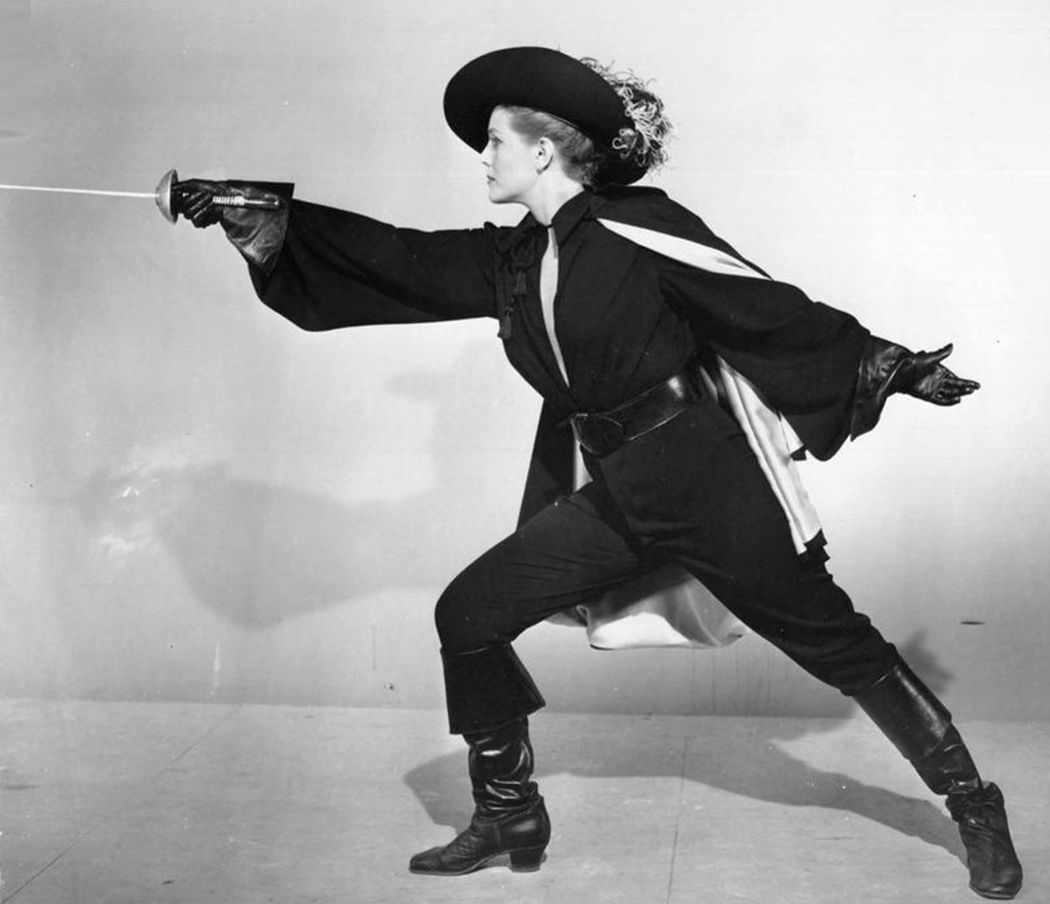 When he enters her private rooms, after she has just redressed as her normal self again, he takes – unasked – a seat and puts his shoes on the table. He also forces a kiss on Lady Christianne. When she snaps, “You don’t behave like a gentlemen should!“ he answers, “Well, you don’t behave like a woman should!“ You are left a bit baffled wondering how women in 1951 were supposed to behave when being kissed involuntarily, by an unknown stranger, who just entered your home through the window? But then even her nanny seems to agree (“A young lady shouldn’t run away from a man, she should catch one!”). How things have changed since that time!
When he enters her private rooms, after she has just redressed as her normal self again, he takes – unasked – a seat and puts his shoes on the table. He also forces a kiss on Lady Christianne. When she snaps, “You don’t behave like a gentlemen should!“ he answers, “Well, you don’t behave like a woman should!“ You are left a bit baffled wondering how women in 1951 were supposed to behave when being kissed involuntarily, by an unknown stranger, who just entered your home through the window? But then even her nanny seems to agree (“A young lady shouldn’t run away from a man, she should catch one!”). How things have changed since that time!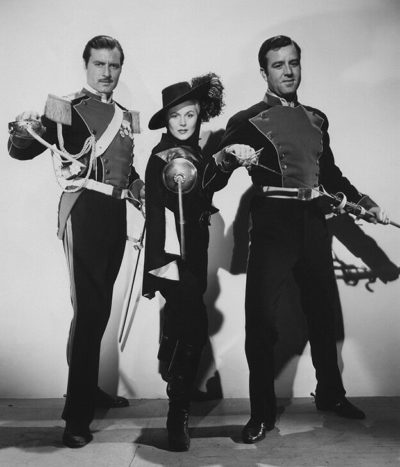 Countess Christianne does enough riding, fencing and chandelier-swinging to be rightfully included in the genre of female action heroines. Yes, she is not alone: Captain Renault comes across like a second-class Errol Flynn, supporting her and hinting as to her “true motives“ for cross-dressing and fighting (“You don’t fight against the king! I think, you are fighting against your female nature!“). Though Renault kills the big bad, she still has a mind of her own, riding with the Royal dragoons and killing off LaRoche’s right-hand man, Major Nicolet (Conrad).
Countess Christianne does enough riding, fencing and chandelier-swinging to be rightfully included in the genre of female action heroines. Yes, she is not alone: Captain Renault comes across like a second-class Errol Flynn, supporting her and hinting as to her “true motives“ for cross-dressing and fighting (“You don’t fight against the king! I think, you are fighting against your female nature!“). Though Renault kills the big bad, she still has a mind of her own, riding with the Royal dragoons and killing off LaRoche’s right-hand man, Major Nicolet (Conrad).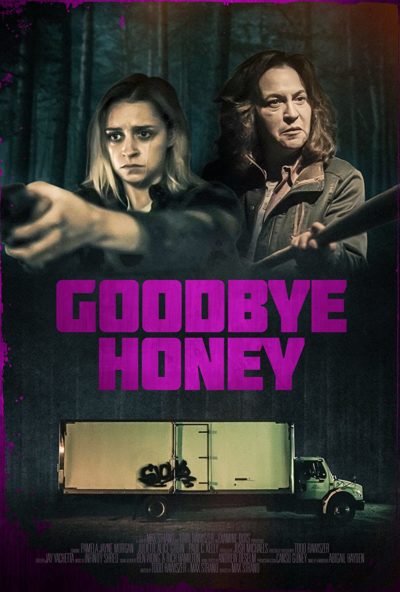 There is a good concept here. Unfortunately, rarely have I seen an idea so conspicuously derailed by dreadful execution. Let’s not get ahead of ourselves though, and begin by focusing on the positives here. Dawn (Morgan) is a truck driver who is on a cross-country route, and pulls off the road into a remote, wooded location for an obligatory rest stop. Barely has she come to a halt, when a terrified young woman, Phoebe (Gobin), shows up outside her cab, demanding help. She claims to have been abducted, and been held nearby. But she managed to escape from her kidnapper, who is now hot on her heels, with evil intentions. However, is the new arrival speaking the truth or is she dangerously deranged?
There is a good concept here. Unfortunately, rarely have I seen an idea so conspicuously derailed by dreadful execution. Let’s not get ahead of ourselves though, and begin by focusing on the positives here. Dawn (Morgan) is a truck driver who is on a cross-country route, and pulls off the road into a remote, wooded location for an obligatory rest stop. Barely has she come to a halt, when a terrified young woman, Phoebe (Gobin), shows up outside her cab, demanding help. She claims to have been abducted, and been held nearby. But she managed to escape from her kidnapper, who is now hot on her heels, with evil intentions. However, is the new arrival speaking the truth or is she dangerously deranged?
 This was a very pleasant surprise. I wasn’t expecting much from this, especially after seeing Wynorski’s name – let’s be honest, he is best known for bargain basement soft-port. That said, he does occasionally hit one out of the park, such as the sublime Deathstalker II. This is definitely one of his better entries, even if it is, by and large, a low-budget version of Assault on Precinct 13.
This was a very pleasant surprise. I wasn’t expecting much from this, especially after seeing Wynorski’s name – let’s be honest, he is best known for bargain basement soft-port. That said, he does occasionally hit one out of the park, such as the sublime Deathstalker II. This is definitely one of his better entries, even if it is, by and large, a low-budget version of Assault on Precinct 13.
 This probably falls into the category of lightly amusing, rather than anything more. But I can’t say I was ever bored, and it’s assembled well enough technically that I can’t complain. The heroine is Mi-Young (Uhm), a former North Korean agent, who defected, changed her looks through plastic surgery, and now lives a quiet existence, with a part-time job selling pastries in the local market. She’s married to Seok-Hwan (Park), a computer repairman, and their life is frugal as far as wealth goes. Seok-Hwan, however, is wins a promotion run by a soft-drink company, getting them and their young daughter a trip to Hawaii.
This probably falls into the category of lightly amusing, rather than anything more. But I can’t say I was ever bored, and it’s assembled well enough technically that I can’t complain. The heroine is Mi-Young (Uhm), a former North Korean agent, who defected, changed her looks through plastic surgery, and now lives a quiet existence, with a part-time job selling pastries in the local market. She’s married to Seok-Hwan (Park), a computer repairman, and their life is frugal as far as wealth goes. Seok-Hwan, however, is wins a promotion run by a soft-drink company, getting them and their young daughter a trip to Hawaii.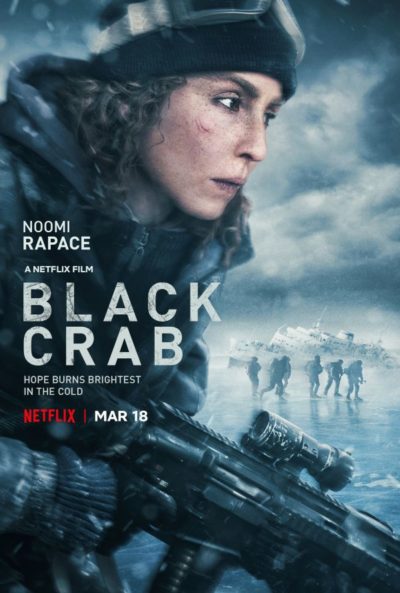 Rapace seems to be turning into a female version of Ryan Reynolds. By which I mean, it seems that hardly a month goes past without a new Netflix Original coming out starring her. Ryan had 6 Underground, Red Notice and The Adam Project. Noomi has given us
Rapace seems to be turning into a female version of Ryan Reynolds. By which I mean, it seems that hardly a month goes past without a new Netflix Original coming out starring her. Ryan had 6 Underground, Red Notice and The Adam Project. Noomi has given us